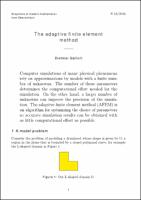| dc.contributor.author | Gallistl, Dietmar | |
| dc.contributor.editor | Cooper, Andrew | |
| dc.contributor.editor | Cederbaum, Carla | |
| dc.date.accessioned | 2016-10-25T10:58:07Z | |
| dc.date.available | 2016-10-25T10:58:07Z | |
| dc.date.issued | 2016 | |
| dc.identifier.uri | http://publications.mfo.de/handle/mfo/1254 | |
| dc.description.abstract | Computer simulations of many physical phenomena rely on approximations by models with a finite number of unknowns. The number of these parameters determines the computational effort needed for the simulation. On the other hand, a larger number of unknowns can improve the precision of the simulation. The adaptive finite element method (AFEM) is an algorithm for optimizing the choice of parameters so accurate simulation results can be obtained with as little computational effort as possible. | en |
| dc.language.iso | en | en |
| dc.publisher | Mathematisches Forschungsinstitut Oberwolfach | en |
| dc.relation.ispartofseries | Snapshots of modern mathematics from Oberwolfach; 2016,13 | |
| dc.rights | Attribution-ShareAlike 4.0 International | * |
| dc.rights.uri | http://creativecommons.org/licenses/by-sa/4.0/ | * |
| dc.title | The adaptive finite element method | en |
| dc.type | Article | en |
| dc.identifier.doi | 10.14760/SNAP-2016-013-EN | |
| local.series.id | SNAP-2016-013-EN | |
| local.subject.snapshot | Numerics and Scientific Computing | |
| dc.identifier.urn | urn:nbn:de:101:1-201611178244 | |
| dc.identifier.ppn | 1653793023 | |


